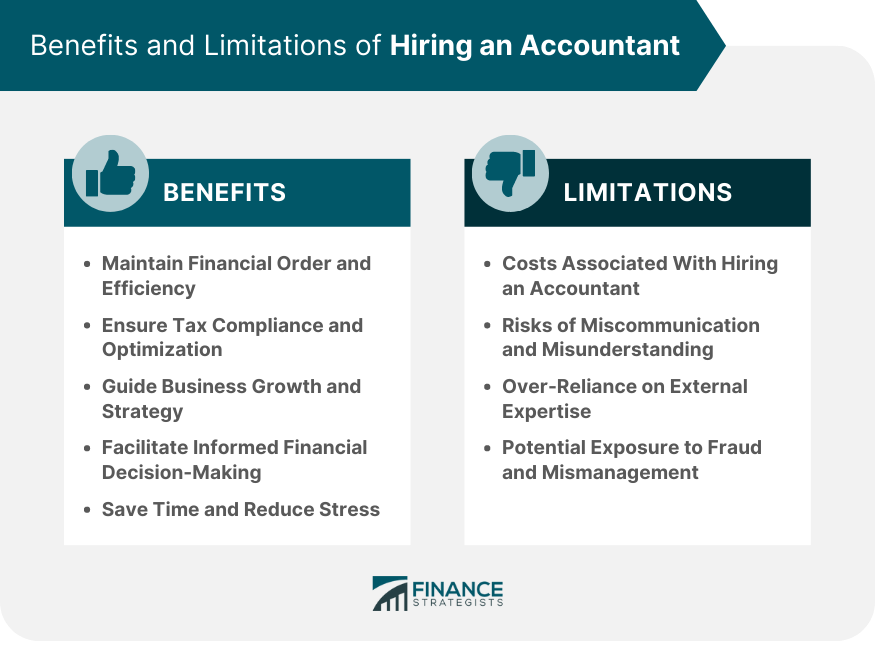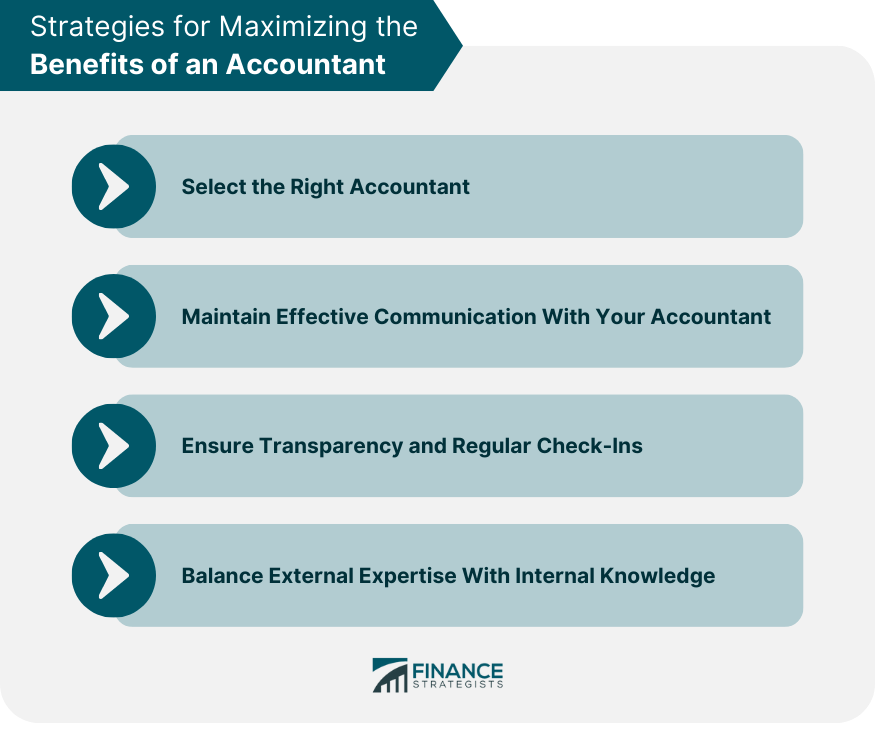An accountant revolutionizes financial decision-making and ensures regulatory compliance. They oversee bookkeeping, payroll, and financial reporting with unmatched efficiency. Accountants navigate tax laws to optimize compliance, maximizing deductions and credits for significant savings. They provide valuable financial insights and strategic advice, driving business growth through informed decision-making. Accountants contribute to long-term stability and growth, establishing a strong foundation for success. By entrusting financial tasks to an accountant, you save time and reduce stress, focusing on core business operations. They are an indispensable asset, offering expertise, prosperity, and stability to your business. One of the most immediate benefits of hiring an accountant is the improvement in financial order and efficiency. Businesses generate a lot of financial data, from sales invoices and purchase orders to payroll and expense reports. An accountant can efficiently manage and make sense of all this data, ensuring that your financial records are accurate, up-to-date, and ready for any necessary scrutiny. This not only helps you keep a finger on your business's pulse but also allows you to identify issues before they become problems. Taxes are a complex field, and understanding the intricate tax laws and regulations can be a challenge for many businesses. An accountant can help ensure that your business stays compliant with the tax laws, avoiding penalties and potential legal issues. They can also help optimize your tax situation, helping you take advantage of all available tax credits, deductions, and allowances. This not only saves you money but also the stress and time that comes with handling taxes. Accountants can play a crucial role in guiding business growth and strategy. They can provide insights into cash flow patterns, pricing, business financing, and inventory management, among others. These insights can help you identify growth opportunities, make informed decisions, and develop strategic plans. With their understanding of your business's financial health, accountants can help you avoid potential pitfalls and capitalize on opportunities, positioning your business for success. Informed financial decision-making is key to the success of any business. Accountants can provide valuable financial insights and analysis that allow managers to make better decisions. Whether it's deciding on a significant investment, identifying cost-saving opportunities, or evaluating the financial viability of a new product or service, an accountant's input can be invaluable. Running a business is time-consuming and often stressful, especially when you're juggling multiple tasks. By taking care of your financial matters, an accountant can save you a significant amount of time, allowing you to focus on other critical areas of your business. Plus, knowing that a professional is handling your financial affairs can provide peace of mind, reducing stress and contributing to a healthier work-life balance. Hiring an accountant is an investment, and it comes with costs. Depending on the complexity of your financial situation and the services you need, these costs can be significant. However, many businesses find that the benefits an accountant provides - such as potential tax savings, improved financial management, and peace of mind - often outweigh the costs. Working with an accountant involves communication, and sometimes, misunderstandings can occur. These can lead to errors or disagreements, which can impact your business. It's crucial to maintain open and clear communication with your accountant to avoid these issues. While hiring an accountant brings numerous benefits, there's a risk of becoming overly reliant on their expertise. It's important for business owners to have a basic understanding of financial management principles to maintain control over their business's financial health. While most accountants are trustworthy professionals, there's always a risk of fraud or mismanagement. This is particularly true if you give your accountant complete control over your business's financial affairs without adequate oversight or checks and balances. Choosing the right accountant is crucial for maximizing the benefits of their services. Consider their experience, qualifications, knowledge of your industry, and communication skills. It's also important to ensure they understand your business goals and can provide the services you need. Effective communication is key to a successful relationship with your accountant. Make sure you communicate your business goals, financial situation, and expectations clearly. Regular meetings or check-ins can help keep everyone on the same page and ensure you're getting the most from your accountant's services. Transparency is crucial when working with an accountant. Make sure you have access to all financial records and understand how your accountant is managing your finances. Regular check-ins can help ensure transparency, catch any potential issues early and allow for adjustments as necessary. While it's beneficial to rely on an accountant's expertise, it's also important to have a basic understanding of financial management. This can help you maintain control over your business's financial health, make informed decisions, and work more effectively with your accountant. Hiring an accountant is an investment that brings about multifaceted benefits. They ensure financial order, keeping business data accurate and up-to-date, and help in maintaining tax compliance and optimization. Their strategic insights into various financial aspects aid in informed decision-making and business growth. By managing financial tasks, they save business owners time and reduce stress. However, this investment also has potential limitations like costs, risk of misunderstandings, over-reliance on external expertise, and exposure to fraud. To maximize benefits, it's essential to select an accountant fitting your business's needs, maintain effective communication, ensure transparency, and balance external expertise with internal financial knowledge. Thus, an accountant's role goes beyond traditional number-crunching; they are instrumental in driving long-term business stability and growth.What Are the Benefits of Having an Accountant?
Benefits of Hiring an Accountant
Maintaining Financial Order and Efficiency
Ensuring Tax Compliance and Optimization
Guiding Business Growth and Strategy
Facilitating Informed Financial Decision-Making
Saving Time and Reducing Stress
Limitations of Relying on an Accountant
Costs Associated With Hiring an Accountant
Risks of Miscommunication and Misunderstanding
Over-Reliance on External Expertise
Potential Exposure to Fraud and Mismanagement

Strategies for Maximizing the Benefits of an Accountant
Select the Right Accountant
Maintain Effective Communication With Your Accountant
Ensure Transparency and Regular Check-Ins
Balance External Expertise With Internal Knowledge

Conclusion
Benefits of Having an Accountant FAQs
Having an accountant can significantly benefit a small business by ensuring financial accuracy, maintaining tax compliance, offering strategic financial insights, and saving time by handling complex financial tasks. This allows business owners to focus on core operational areas.
An accountant contributes to business growth by providing valuable financial insights and analyses that can guide strategic decision-making. They can identify growth opportunities, help optimize cash flow, and advise on cost-saving strategies.
Yes, an accountant can save business money in several ways, such as by ensuring tax optimization, identifying cost-saving opportunities, and preventing costly financial mistakes. They can also help avoid penalties and fees associated with non-compliance.
Some potential drawbacks of having an accountant include the costs of their services, risks of miscommunication or misunderstandings, potential over-reliance on their expertise, and in rare cases, exposure to fraud or mismanagement.
A business can maximize the benefits of having an accountant by selecting the right professional that suits their needs, maintaining effective communication, ensuring transparency in all financial dealings, and having a basic understanding of financial management principles to balance external expertise with internal knowledge.
True Tamplin is a published author, public speaker, CEO of UpDigital, and founder of Finance Strategists.
True is a Certified Educator in Personal Finance (CEPF®), author of The Handy Financial Ratios Guide, a member of the Society for Advancing Business Editing and Writing, contributes to his financial education site, Finance Strategists, and has spoken to various financial communities such as the CFA Institute, as well as university students like his Alma mater, Biola University, where he received a bachelor of science in business and data analytics.
To learn more about True, visit his personal website or view his author profiles on Amazon, Nasdaq and Forbes.











